Navigation
More options
You are using an out of date browser. It may not display this or other websites correctly.
You should upgrade or use an alternative browser.
You should upgrade or use an alternative browser.
Nchi nyingi duniani zimewazuia wasafiri toka India kuingia kwenye Nchi zao, Tanzania tunasubiri nini?
BAK
JF-Expert Member
- Feb 11, 2007
- 124,789
- 288,011
- Thread starter
- #62
Kenya Suspends India Flights Over Covid Surge
28 APRIL 2021 Capital FM (Nairobi)
By Jemimah Mueni
Nairobi — Kenya announced Wednesday the suspension of flights to and from India following a surge in COVID-19 infections and deaths.
India has been reporting over 300,000 COVID cases daily, with over 2,000 deaths in the recent weeks, a situation that has overwhelmed the country's health care system and crematoriums.
"Given the dire events in India, we resolved to suspend all passenger flights in and out of the country for a period of 14 days. This suspension is to take effect from midnight this coming Saturday," said Mutahi Kagwe, Health Cabinet Secretary after a meeting with the National Emergency Response Committee (NERC).
Kagwe said passengers arriving from India in the next 72 hours will have to undertake mandatory testing, and will undergo a 14-days mandatory quarantine at their own cost.
"All passengers arriving from India within these 72 hours shall be subjected to rapid antigen testing upon arrival at our ports of entry and shall be required to strictly observe a 14-day quarantine period that will be closely monitored by our health officials," he said.
Cargo flights are now affected.
Kenya announced the flight ban on the day India's coronavirus death toll passed 200,000 with more than 3,000 fatalities reported in 24 hours for the first time, official data showed.
A total of 201,187 people have now died, 3,293 of them in the past day, according to health ministry data, although many experts suspect that the true toll is higher.
India has now reported 18 million infections, an increase of 360,000 in 24 hours, which is a new world record. This month alone the country has added almost six million new cases.
The explosion in cases, blamed in part on a new virus variant as well as mass political and religious events, has overwhelmed hospitals with dire shortages of beds, drugs and oxygen.
The crisis is particularly severe in New Delhi, with people dying outside packed hospitals where three people are often forced to share beds. Clinics have been running out of oxygen.
India has so far administered 150 million vaccine shots and from Saturday the programme will be expanded to include all adults, meaning 600 million more people will be eligible.
However, many states are warning that they have insufficient vaccine stocks and experts are calling on the government to prioritise vulnerable groups and badly hit areas.
28 APRIL 2021 Capital FM (Nairobi)
By Jemimah Mueni
Nairobi — Kenya announced Wednesday the suspension of flights to and from India following a surge in COVID-19 infections and deaths.
India has been reporting over 300,000 COVID cases daily, with over 2,000 deaths in the recent weeks, a situation that has overwhelmed the country's health care system and crematoriums.
"Given the dire events in India, we resolved to suspend all passenger flights in and out of the country for a period of 14 days. This suspension is to take effect from midnight this coming Saturday," said Mutahi Kagwe, Health Cabinet Secretary after a meeting with the National Emergency Response Committee (NERC).
Kagwe said passengers arriving from India in the next 72 hours will have to undertake mandatory testing, and will undergo a 14-days mandatory quarantine at their own cost.
"All passengers arriving from India within these 72 hours shall be subjected to rapid antigen testing upon arrival at our ports of entry and shall be required to strictly observe a 14-day quarantine period that will be closely monitored by our health officials," he said.
Cargo flights are now affected.
Kenya announced the flight ban on the day India's coronavirus death toll passed 200,000 with more than 3,000 fatalities reported in 24 hours for the first time, official data showed.
A total of 201,187 people have now died, 3,293 of them in the past day, according to health ministry data, although many experts suspect that the true toll is higher.
India has now reported 18 million infections, an increase of 360,000 in 24 hours, which is a new world record. This month alone the country has added almost six million new cases.
The explosion in cases, blamed in part on a new virus variant as well as mass political and religious events, has overwhelmed hospitals with dire shortages of beds, drugs and oxygen.
The crisis is particularly severe in New Delhi, with people dying outside packed hospitals where three people are often forced to share beds. Clinics have been running out of oxygen.
India has so far administered 150 million vaccine shots and from Saturday the programme will be expanded to include all adults, meaning 600 million more people will be eligible.
However, many states are warning that they have insufficient vaccine stocks and experts are calling on the government to prioritise vulnerable groups and badly hit areas.
Dream Queen
JF-Expert Member
- Nov 4, 2015
- 8,234
- 17,942
Mwanzo tuliambiwa tutaokotwa tukiwa maiti barabaran leo tunaambiwa tutalia na kusaga meno,Kabisa Mkuu au huu ugonjwa ambao sasa umetulia sana nchini utalipuka tena na hapo itakuwa ni vilio vya kusaga meno.
Wafaransa walisema "wajinga ndio waliwao"
BAK
JF-Expert Member
- Feb 11, 2007
- 124,789
- 288,011
- Thread starter
- #66
New Delhi (CNN)There is a split scenario unfolding as the world battles the pandemic.
In countries like the United States and the United Kingdom, jubilant, newly-vaccinated people hug their loved ones after a long period of separation. In India, distraught families count their dead.
Sick people are being turned away from hospitals that have run out of beds and oxygen, as the number of new cases rises to record levels each day, creating a national crisis with global repercussions.
The more the virus spreads, the more chances it has to mutate and create variants that could eventually resist current vaccines, threatening to undermine other countries' progress in containing the pandemic, experts warn.
"If we don't help in India, I worry about an explosion of cases" around the world, said Dr. Ashish Jha, dean of the Brown University School of Public Health.
That's why India's Covid outbreak is a global problem that needs a coordinated response.

Funeral pyres for Covid victims at a crematorium in New Delhi in early April.
Some countries are already scrambling to send supplies.
US oxygen concentrators -- medical devices that compress oxygen from the air -- arrived earlier this week, and on Wednesday the UK, Italy and Germany committed more medical equipment, as Russian planes took off from Zhukovsky for Delhi carrying medicine, monitors and ventilators.
While the immediate priority is saving the lives of those already sick, vaccinating the country is considered crucial to stop the virus from spreading. But, despite being home to the world's biggest vaccine producer, India doesn't have enough doses, and there's no fast and simple way to make more.
Western countries have been criticized for vaccine stockpiling, but on Wednesday, British Health Secretary Matt Hancock said the UK didn't have any spare vaccines to send.
US President Joe Biden said on Tuesday he had spoken with Indian Prime Minister Narendra Modi and confirmed the US intends to send coronavirus vaccines to India. Earlier in the week, the US said it would share 60 million AstraZeneca doses with other countries, but didn't specify which nations or when. Delivering them could take months, the White House warned.

India is not the only Covid-19 hotspot in Asia 02:03
An equitable distribution of the vaccine around the world is essential, said Dr. Anthony Fauci, director of the US' National Institute of Allergy and Infectious Diseases.
"Because we're all in this together. It's an interconnected world. And there are responsibilities that countries have to each other, particularly if you're a wealthy country and you're dealing with countries that don't have the resources or capabilities that you have," he told The Guardian earlier this week.
If the Indian outbreak can't be contained and spreads to neighboring countries with low vaccine supplies and weak health systems, experts warn the world risks replicating scenes witnessed in India -- especially if newer, potentially more contagious variants are allowed to take hold. And, as India has a leading role in making vaccines for other nations, failing to stop its spread there could endanger the vaccine rollout worldwide.
In December, scientists detected a new variant, known as B.1.617, in India, though it's not known if this is driving the local outbreak owing to a lack of genomic surveillance.
Anurag Agrawal, director of the Institute of Genomics and Integrative Biology, said Friday there is a correlation, however, between the rising prevalence of variants and the surge in Indian case numbers.
"In Maharashtra we saw it (B.1.617) go up, we saw an outbreak. We are seeing it go up in Delhi, we are seeing an outbreak. These are very important epidemiological correlations," Agrawal said.
But he noted in Delhi and in north India, another variant, first identified in the UK and known as B.1.1.7, was more dominant than B.1.617. The B.1.1.7 variant is known to be more transmissible.
Fauci said recent data showed that India's homegrown Covid-19 vaccine, Covaxin, neutralized the B1.617 variant, which suggested that vaccinations could be used against it. "Vaccination could be a very, very important antidote," he said, though he added that more information was being gathered each day.
Other variants, first identified by scientists in South Africa and Brazil, are also believed to be more transmissible than the original strain and have already made their way into several other countries.
So far, vaccines from Pfizer/BioNTech, Moderna Inc. and Johnson & Johnson have shown varying degrees of effectiveness against these variants. However, because the virus can mutate as it spreads, and there's no guarantee the available vaccines will protect people from new variants.
This would leave no country protected, no matter how many of its people have been vaccinated.
"For selfish reasons, every country should be concerned about large outbreaks that are out of control," Jha said. "Countries like the UK and the US are doing a great job with vaccinations, and they should be feeling great about it, but that's only as good as variants that are out there."
More than 142 million people in the US and 33 million people aged 18 and over in the UK have received at least one dose of the Covid-19 vaccines -- around 43% and 64% of the eligible population, respectively.
By contrast, around 129 million people in India had received at least one dose of the vaccine, as of April 27, the Indian health ministry reported. That's just over 8% of India's total population. Experts have blamed a slow vaccine rollout and shortage of supply.
Epidemiologist Brahmar Mukherjee says India would need to administer 10 million doses a day to vaccinate all adults in the next five to six months. That is assuming enough doses are available.

A worker fills medical oxygen cylinders on the outskirts of Chennai.
The country is a major player in COVAX, the global vaccine-sharing initiative that provides discounted or free doses for lower-income countries.
India promised to supply 200 million COVAX doses that are being distributed to 92 poor countries. But its own rapidly worsening situation has prompted Delhi to shift focus from COVAX to prioritizing India's own citizens.
The Serum Institute of India (SII) had already delivered 28 million doses of the AstraZeneca vaccine, COVAX said in a statement in March, but was due to ship another 90 million doses in March and April.
Those deliveries would be delayed, it warned, due to rising demand within India.
"I don't think the global leadership has woken up to the scenario of how bad this delay can be for the world," said Shruti Rajagopalan, a Senior Research Fellow at the Mercatus Center at George Mason University.
The moment India is short on vaccines and keeps its supplies for domestic purposes, it means other countries like South Africa and Brazil have to wait, she said. "You're delaying the world getting vaccinated by many months," Shruti added.
John Nkengasong, the director of Africa's disease control body, warned earlier this month that India's hold on exports could be "catastrophic" for the continent's vaccine rollout.
Despite the disruption of Indian supplies, COVAX said it was on track to deliver all scheduled doses in the first half of this year, and by the end of the year expects to provide two billion doses.
The Indian experience underscored the importance of diversifying the supply chain, and COVAX was trying to make deals with more vaccine manufacturers, which would be announce soon, it said.
Before its own coronavirus crisis, India assumed a leadership position in the global effort to end the pandemic.
Prime Minister Narendra Modi promised millions of doses to the COVAX initiative, and earlier this year donated vaccines to other countries, including Guyana, Guatemala, the Seychelles and the Maldives.
The Prime Minister's generosity, however, has not shielded him from public anger at home over his alleged role in exacerbating the domestic health crisis.
For example, Modi allowed a massive weeks-long Hindu pilgrimage to proceed with millions of attendees traveling across numerous states, and his political party held large rallies for upcoming elections in four states and one union territory.

Members of Prime Minister Modi's Bharatiya Janata Party (BJP) held rallies despite rising Covid cases.
The Prime Minister has acknowledged the scale of the crisis, and is trying to speed-up the nationwide vaccination program. From May 1, state governments and private providers will be allowed to vaccinate those who are 18 and older.
The cost of each vaccine dose is dropping too, after the Serum Institute of India (SII) said it would charge less per dose so the states can vaccinate more people. Effective immediately, each dose will cost Rs.300 per dose, down from Rs.400, the equivalent of a drop from $5.30 to $4 per dose, the SII said.
But with hundreds of thousands of new cases each day, India needs much more help to contain the outbreak.
At a World Trade Organization (WTO) meeting last year, India and South Africa proposed that the organization temporarily suspend intellectual property rights in an effort to boost production of Covid-19 vaccines for low-income nations.
It was backed by over 80 developing countries. A temporary ban would allow multiple actors to start production sooner, instead of having manufacturing concentrated in the hands of a small number of patent holders, the Lancet reported.
But richer countries, including Britain, Switzerland, EU nations and the US, blocked it, arguing that suspending the IP would not result in a sudden surge of vaccine supply.
Protecting the IP would encourage research and innovation, they said.
Jha, from the Brown University School of Public Health, said IP wasn't the major roadblock to more vaccines. He said the main problem was a lack of capacity.

Covid mutations from India may have crossed borders 01:55
"If we made IP available today, we will not add vaccines today. It's about tech transfer, knowledge of making vaccines. This is really about a complex biological agent. It's not clear to me that India has a lot of unused vaccine capacity. The issue is building new capacity," Jha said.
However, this brings things back to square one. The longer India's health care system is unable to respond to this public health crisis and the longer the vaccines remain in shortage, the longer this virus will continue to be a threat to the world.
This global pandemic needs a global coordinated response.
"That's the reason why we and other rich countries have to exert what I think is a moral responsibility to help the rest of the world get this under control," Fauci said.
"A year from now we'll be in really much better shape than we are now, but there'll be other countries that won't be. The quicker we get the rest of the world protected, the more secure will our protection be."
In countries like the United States and the United Kingdom, jubilant, newly-vaccinated people hug their loved ones after a long period of separation. In India, distraught families count their dead.
Sick people are being turned away from hospitals that have run out of beds and oxygen, as the number of new cases rises to record levels each day, creating a national crisis with global repercussions.
The more the virus spreads, the more chances it has to mutate and create variants that could eventually resist current vaccines, threatening to undermine other countries' progress in containing the pandemic, experts warn.
"If we don't help in India, I worry about an explosion of cases" around the world, said Dr. Ashish Jha, dean of the Brown University School of Public Health.
That's why India's Covid outbreak is a global problem that needs a coordinated response.
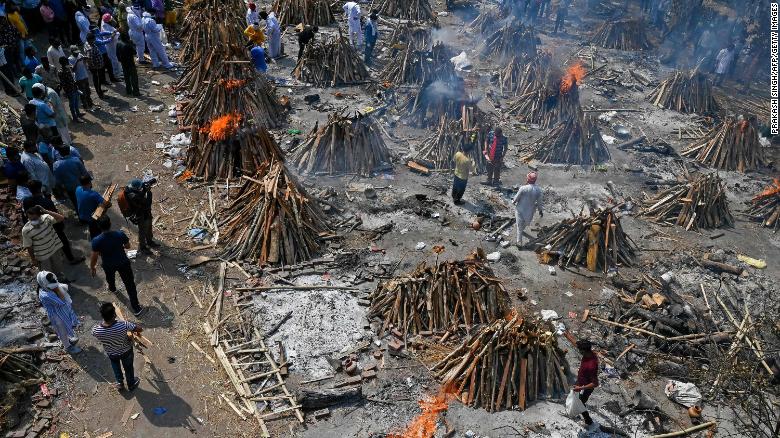
Funeral pyres for Covid victims at a crematorium in New Delhi in early April.
Some countries are already scrambling to send supplies.
US oxygen concentrators -- medical devices that compress oxygen from the air -- arrived earlier this week, and on Wednesday the UK, Italy and Germany committed more medical equipment, as Russian planes took off from Zhukovsky for Delhi carrying medicine, monitors and ventilators.
While the immediate priority is saving the lives of those already sick, vaccinating the country is considered crucial to stop the virus from spreading. But, despite being home to the world's biggest vaccine producer, India doesn't have enough doses, and there's no fast and simple way to make more.
Western countries have been criticized for vaccine stockpiling, but on Wednesday, British Health Secretary Matt Hancock said the UK didn't have any spare vaccines to send.
US President Joe Biden said on Tuesday he had spoken with Indian Prime Minister Narendra Modi and confirmed the US intends to send coronavirus vaccines to India. Earlier in the week, the US said it would share 60 million AstraZeneca doses with other countries, but didn't specify which nations or when. Delivering them could take months, the White House warned.

India is not the only Covid-19 hotspot in Asia 02:03
An equitable distribution of the vaccine around the world is essential, said Dr. Anthony Fauci, director of the US' National Institute of Allergy and Infectious Diseases.
"Because we're all in this together. It's an interconnected world. And there are responsibilities that countries have to each other, particularly if you're a wealthy country and you're dealing with countries that don't have the resources or capabilities that you have," he told The Guardian earlier this week.
If the Indian outbreak can't be contained and spreads to neighboring countries with low vaccine supplies and weak health systems, experts warn the world risks replicating scenes witnessed in India -- especially if newer, potentially more contagious variants are allowed to take hold. And, as India has a leading role in making vaccines for other nations, failing to stop its spread there could endanger the vaccine rollout worldwide.
Variants vs vaccines
Coronavirus was first detected in the Chinese city of Wuhan, and has since spread across the world from person to person, in some cases, mutating into new variants.In December, scientists detected a new variant, known as B.1.617, in India, though it's not known if this is driving the local outbreak owing to a lack of genomic surveillance.
Anurag Agrawal, director of the Institute of Genomics and Integrative Biology, said Friday there is a correlation, however, between the rising prevalence of variants and the surge in Indian case numbers.
"In Maharashtra we saw it (B.1.617) go up, we saw an outbreak. We are seeing it go up in Delhi, we are seeing an outbreak. These are very important epidemiological correlations," Agrawal said.
But he noted in Delhi and in north India, another variant, first identified in the UK and known as B.1.1.7, was more dominant than B.1.617. The B.1.1.7 variant is known to be more transmissible.
Fauci said recent data showed that India's homegrown Covid-19 vaccine, Covaxin, neutralized the B1.617 variant, which suggested that vaccinations could be used against it. "Vaccination could be a very, very important antidote," he said, though he added that more information was being gathered each day.
Other variants, first identified by scientists in South Africa and Brazil, are also believed to be more transmissible than the original strain and have already made their way into several other countries.
So far, vaccines from Pfizer/BioNTech, Moderna Inc. and Johnson & Johnson have shown varying degrees of effectiveness against these variants. However, because the virus can mutate as it spreads, and there's no guarantee the available vaccines will protect people from new variants.
This would leave no country protected, no matter how many of its people have been vaccinated.
"For selfish reasons, every country should be concerned about large outbreaks that are out of control," Jha said. "Countries like the UK and the US are doing a great job with vaccinations, and they should be feeling great about it, but that's only as good as variants that are out there."
More than 142 million people in the US and 33 million people aged 18 and over in the UK have received at least one dose of the Covid-19 vaccines -- around 43% and 64% of the eligible population, respectively.
By contrast, around 129 million people in India had received at least one dose of the vaccine, as of April 27, the Indian health ministry reported. That's just over 8% of India's total population. Experts have blamed a slow vaccine rollout and shortage of supply.
Epidemiologist Brahmar Mukherjee says India would need to administer 10 million doses a day to vaccinate all adults in the next five to six months. That is assuming enough doses are available.
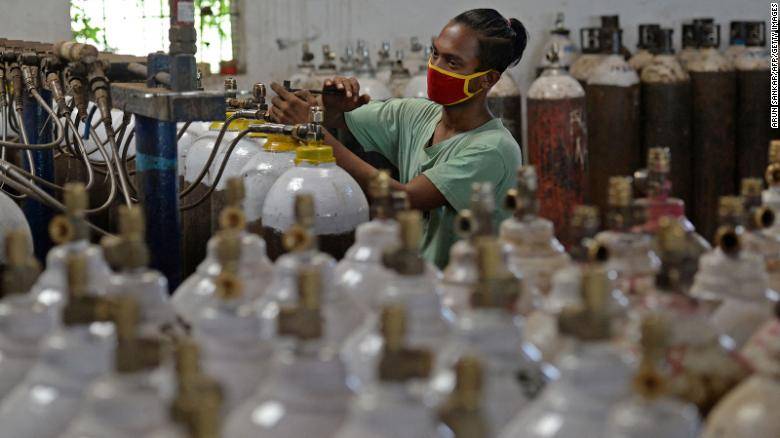
A worker fills medical oxygen cylinders on the outskirts of Chennai.
The need to help sustain India's vaccine infrastructure
Beyond the risk of new variants, India's second wave of cases presents another, more immediate problem for the world.The country is a major player in COVAX, the global vaccine-sharing initiative that provides discounted or free doses for lower-income countries.
India promised to supply 200 million COVAX doses that are being distributed to 92 poor countries. But its own rapidly worsening situation has prompted Delhi to shift focus from COVAX to prioritizing India's own citizens.
The Serum Institute of India (SII) had already delivered 28 million doses of the AstraZeneca vaccine, COVAX said in a statement in March, but was due to ship another 90 million doses in March and April.
Those deliveries would be delayed, it warned, due to rising demand within India.
"I don't think the global leadership has woken up to the scenario of how bad this delay can be for the world," said Shruti Rajagopalan, a Senior Research Fellow at the Mercatus Center at George Mason University.
The moment India is short on vaccines and keeps its supplies for domestic purposes, it means other countries like South Africa and Brazil have to wait, she said. "You're delaying the world getting vaccinated by many months," Shruti added.
John Nkengasong, the director of Africa's disease control body, warned earlier this month that India's hold on exports could be "catastrophic" for the continent's vaccine rollout.
Despite the disruption of Indian supplies, COVAX said it was on track to deliver all scheduled doses in the first half of this year, and by the end of the year expects to provide two billion doses.
The Indian experience underscored the importance of diversifying the supply chain, and COVAX was trying to make deals with more vaccine manufacturers, which would be announce soon, it said.
Modi's pandemic response
Before its own coronavirus crisis, India assumed a leadership position in the global effort to end the pandemic.
Prime Minister Narendra Modi promised millions of doses to the COVAX initiative, and earlier this year donated vaccines to other countries, including Guyana, Guatemala, the Seychelles and the Maldives.
The Prime Minister's generosity, however, has not shielded him from public anger at home over his alleged role in exacerbating the domestic health crisis.
For example, Modi allowed a massive weeks-long Hindu pilgrimage to proceed with millions of attendees traveling across numerous states, and his political party held large rallies for upcoming elections in four states and one union territory.
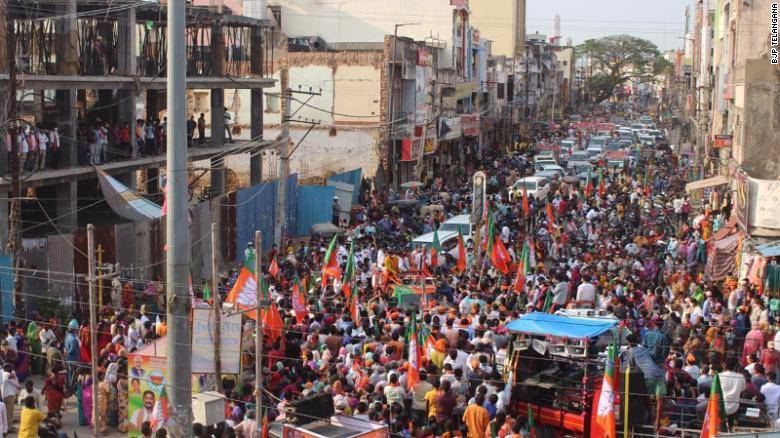
Members of Prime Minister Modi's Bharatiya Janata Party (BJP) held rallies despite rising Covid cases.
The Prime Minister has acknowledged the scale of the crisis, and is trying to speed-up the nationwide vaccination program. From May 1, state governments and private providers will be allowed to vaccinate those who are 18 and older.
The cost of each vaccine dose is dropping too, after the Serum Institute of India (SII) said it would charge less per dose so the states can vaccinate more people. Effective immediately, each dose will cost Rs.300 per dose, down from Rs.400, the equivalent of a drop from $5.30 to $4 per dose, the SII said.
But with hundreds of thousands of new cases each day, India needs much more help to contain the outbreak.
A WTO fight further corners low-income nations
India has tried to create more flexibility in the market for vaccines.At a World Trade Organization (WTO) meeting last year, India and South Africa proposed that the organization temporarily suspend intellectual property rights in an effort to boost production of Covid-19 vaccines for low-income nations.
It was backed by over 80 developing countries. A temporary ban would allow multiple actors to start production sooner, instead of having manufacturing concentrated in the hands of a small number of patent holders, the Lancet reported.
But richer countries, including Britain, Switzerland, EU nations and the US, blocked it, arguing that suspending the IP would not result in a sudden surge of vaccine supply.
Protecting the IP would encourage research and innovation, they said.
Jha, from the Brown University School of Public Health, said IP wasn't the major roadblock to more vaccines. He said the main problem was a lack of capacity.
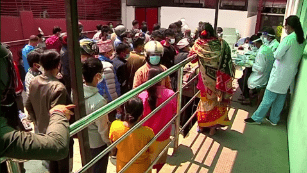
Covid mutations from India may have crossed borders 01:55
"If we made IP available today, we will not add vaccines today. It's about tech transfer, knowledge of making vaccines. This is really about a complex biological agent. It's not clear to me that India has a lot of unused vaccine capacity. The issue is building new capacity," Jha said.
However, this brings things back to square one. The longer India's health care system is unable to respond to this public health crisis and the longer the vaccines remain in shortage, the longer this virus will continue to be a threat to the world.
This global pandemic needs a global coordinated response.
"That's the reason why we and other rich countries have to exert what I think is a moral responsibility to help the rest of the world get this under control," Fauci said.
"A year from now we'll be in really much better shape than we are now, but there'll be other countries that won't be. The quicker we get the rest of the world protected, the more secure will our protection be."
BAK
JF-Expert Member
- Feb 11, 2007
- 124,789
- 288,011
- Thread starter
- #67
Act now': Africa medics warn of India-like Covid surge
FRIDAY APRIL 30 2021
Nairobi residents, wearing face masks to help prevent the spread of the coronavirus, wait to board matatus on Accra Road on May 27, 2020. PHOTO | FILE | NMG
ADVERTISEMENTBy AFP
More by this Author
Africa risks being overrun by coronavirus infections if urgent measures are not taken to avert a similar disaster to the "very concerning" crisis in India, the continent's disease control body said Thursday.
India, a vast subcontinent with a population similar to that of Africa, is fighting an explosion of infections, with jarring scenes of citizens desperately seeking oxygen and medicines.
This has prompted fears that as new variants spread, Africa's fragile healthcare systems could crash.
"We are watching in total disbelief what is happening in India. The situation in India is very, very concerning to us as a continent. It speaks to the fact that we as a continent must be very prepared," Dr John Nkengasong, director of the Africa Centres for Disease Control and Prevention (Africa CDC), told a press conference.
Despite early predictions of disaster on the continent, Africa has so far been spared compared to other regions, counting 3.1 percent of global virus cases and about four percent of global deaths, according to the Africa CDC.
India, like many African nations, took strict early measures to combat the virus and it appeared the country had been spared the worst because of its young population.
Related
- WHO cautions against use of vaccine passports for international travel
- India posts global record for new Covid-19 cases
- Africa seeks to produce 60pc of its vaccines by 2040
- Vaccination yet to go full throttle in Africa
However a new variant and mass gatherings have led to a surge in infections that has overwhelmed Indian hospitals, crematoriums and graveyards.
"It is a wakeup call. We cannot be indifferent to what is happening in India. We must act now, decisively and collectively," said Nkengasong.
The African Union will convene an emergency meeting with member states' health ministers on May 8.
"We need to regroup and prepare ourselves," said Nkengasong.
India on Thursday reported 3,645 deaths and almost 380,000 cases in the last 24 hours.
Africa CDC urged a return to the basics of heeding public health guidelines to keep infections at bay by avoiding mass gatherings and wearing face masks.
"Masks work. They are the only 'vaccines' we have," said Nkengasong.
Africa still lags behind in its inoculation campaign, with the process suffering a setback after India, which manufactures the shots supplied through the global vaccine-sharing facility Covax, decided to reduce exports to address domestic needs.
But Nkengasong said vaccine hesitancy was also hindering uptake.
Some countries, including the Democratic Republic of Congo, have had to return jabs to the Covax facility for redistribution after failing to use them with expiry fast approaching. Jabs have also expired in South Sudan and Malawi.
So far, the continent has administered 17.9 million doses of vaccines.
Kibanga Ampiga Mkoloni
JF-Expert Member
- Aug 9, 2007
- 18,697
- 8,843
Tunasubiri ya mwaka jana, maan wao ndio walleta hii wave ya pili, na walikufa wahindi wakutosha.
sijasoma hizo text.najibu title yako. Wakiingia bongo wanapona wenyeweCovid: India on UK travel red list as Covid crisis grows
Coronavirus pandemic
A medic tests a bus passenger in Jaipur, Rajasthan, India, on Thursday
India has joined the UK's travel red list - effectively banning travel - as a deadly second wave of infections sweeps the country.
British and Irish nationals can travel to the UK from India, but they must now isolate in a government-approved hotel.
India has seen soaring infection rates, a rapidly rising death toll and the discovery of a new virus variant.
The spike has overwhelmed hospitals, creating a critical shortage of oxygen, intensive care beds and ventilators.
What are the travel quarantine rules?
Why was India not already on the red list?
Why India is running out of oxygen again
On Friday, India recorded 332,730 coronavirus cases, the highest one-day tally anywhere in the world for the second day in a row. Daily deaths from Covid-19 rose by a record 2,263 in the previous 24 hours.
At least two hospitals in the Indian capital Delhi are running out of oxygen, and at least 13 patients have died after a fire broke out in the intensive care unit of a hospital set up to treat Covid patients near Mumbai.
The rising number of cases has resulted in a deepening healthcare crisis that has gripped several states, and India's top court has asked the central government for a national plan by Friday on bolstering supply, oxygen, medicine, treatment and vaccines.
'Ordeal after ordeal'
Nayan Gangyan
Nayan Gangyan is facing a 10-day hotel quarantine when he flies back to London from northern India on Saturday. He travelled to Chandigarh a few weeks ago, when his parents both contracted coronavirus.
He told BBC Breakfast he was left feeling "helpless" in the UK when his father's oxygen levels dropped, there were no beds available in hospital and his mother started to panic.
"It was at that point that I decided 'my family needs help and I need to go back come what may'," he says.
He says the situation in India is "really bad", with the government healthcare system "completely overrun". But they eventually managed to get his father admitted to a hospital where he had previously undergone a liver transplant, and he is doing "much better now".
Now Nayan is preparing to return home to London. "The flight as of now, it's running. I really hope that it does take off," he says.
"I've already booked my quarantine hotel so I'll be going straight there. I'll be landing [then] straight to the hotel and 10 days in the room."
Vani Goyal
His wife Vani, who has been watching from a distance from their London home, says it has been difficult "not to be able to control or influence" events.
On India's red list status, she says: "We got just over three days' notice so very little time for us to actually affect the outcome or do anything.
"We're just in the position where we have to be okay. After Nayan's ordeal in India he has to go through another ordeal."
line
Tina Patel and her husband arrived back in the UK on Thursday from Pune, Maharashtra, after travelling to India in March to visit her father-in-law, who was ill due to old age and later died.
She told the BBC people in the city were "desperate" - trying to find hospital beds or a slot in the crematoriums. "We left a city with ambulances wailing away day and night," she said.
"I left broken-hearted as there was nothing we could do but catch the BA flight last night and all we could do was to be thankful that we finally got home."
Friday's travel rule change means direct flights from India are still permitted, but UK and Irish nationals, as well as those with residency rights, must isolate in government-approved hotels - at their own cost - for 10 days.
Travel to the UK is banned for all others who have been in red-list countries in the past 10 days.
There are 40 countries on the government's red list across the Middle East, Africa, Asia and South America. Countries can be added to the list with just a few hours' notice.
There are specific rules for people arriving in each UK nation, including England, Scotland, Northern Ireland and Wales.
'It feels like we're back to square one in India'
What is the India Covid variant?
Public Health England (PHE) confirmed on Thursday that a further 55 cases of the virus variant first identified in India - known as B.1.617 - were found in the UK in the latest week to 14 April.
PHE experts are currently unsure whether any of the mutations mean the variant can be transmitted more easily, is more deadly or can evade the effectiveness of vaccines or natural immunity.
The final scheduled commercial flight ahead of the rule change - Vistara flight VTI017 - landed at London's Heathrow Airport at 18:48 on Thursday, according to FlightRadar24.
Four airlines asked for a total of eight extra flights to arrive at the west London airport before the 04:00 deadline but were refused permission by airport authorities.
Heathrow bosses are believed to have declined the requests to ensure pressures at the border, reported in recent weeks, were not exacerbated.
Later scheduled arrivals from Delhi and Mumbai to Heathrow, and Delhi to Gatwick Airport, were cancelled on Thursday, airport data showed.
media captionTravellers returning from India: "Oh my goodness, feeling so relieved"
Some of those who arrived before the red list change told the BBC they "couldn't afford to stay away" and "had to get back to work".
"Eventually, yesterday, a friend in the UK managed to book me a ticket from Mumbai to Manchester," Biju Mathew, a social services manager from Walsall, said.
Demand for flights from India to the UK quickly became overwhelming after the government's red list announcement, according to Suresh Kumar, chairman of specialist travel agents Indra Travel.
"A lot of people were hoping that the [UK] government would have made arrangements for people trying to get back," he said. "They were disappointed."
Speaking on Tuesday, Prime Minister Boris Johnson - who cancelled an official visit to India due to take place next Monday - said the addition to the red list was a "purely precautionary" step over a new coronavirus variant.
He said: "What we're seeing in India is a result of a variant under investigation, it hasn't yet been deemed a variant of concern - I think that was why there has been the delay."
BAK
JF-Expert Member
- Feb 11, 2007
- 124,789
- 288,011
- Thread starter
- #72
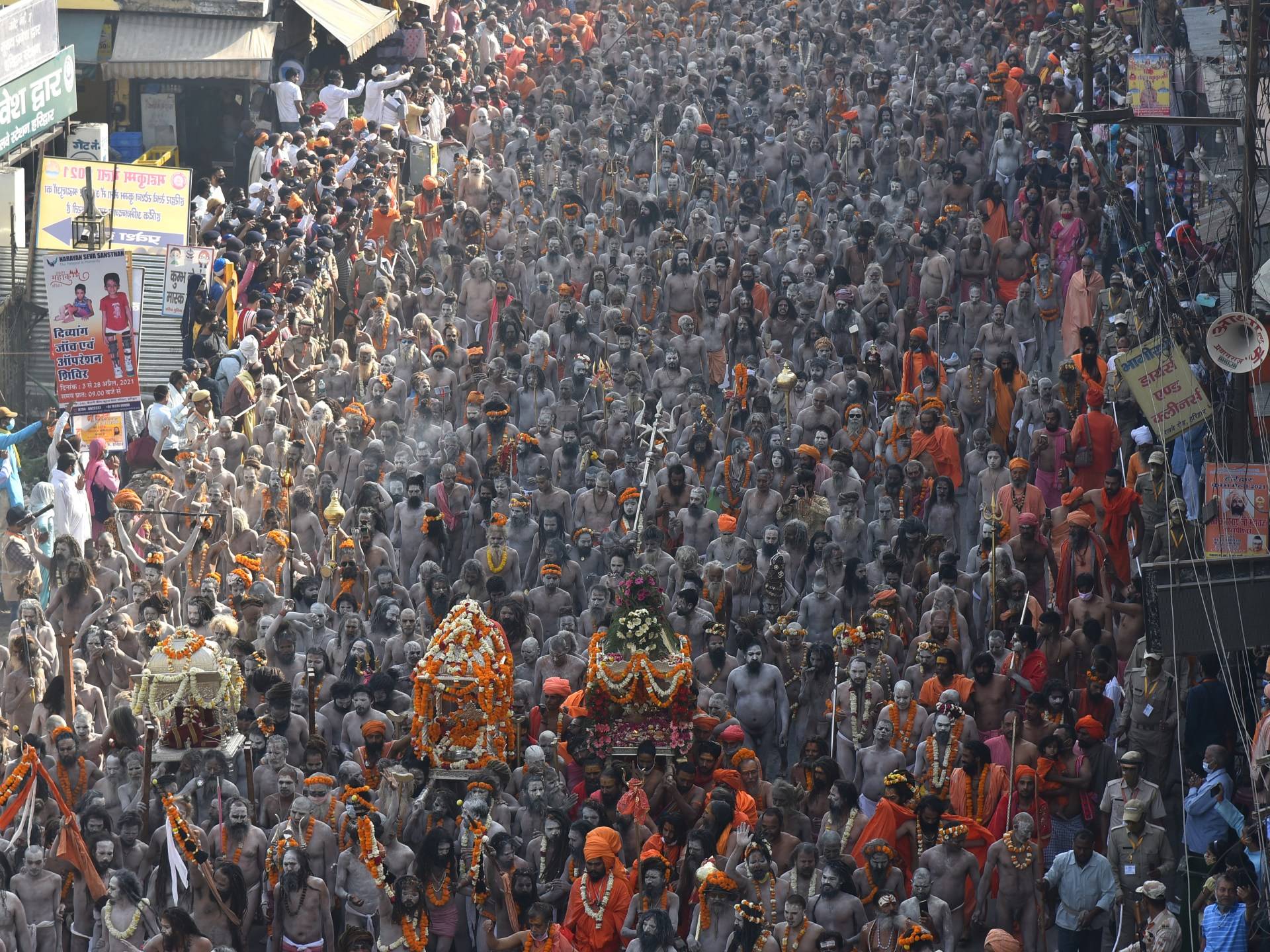
Photos: India’s deadly coronavirus surge follows crowded events
India’s devastating second wave was fuelled by a series of crowded events, including mass rallies addressed by PM Modi.
Saint Ivuga
JF-Expert Member
- Aug 21, 2008
- 54,363
- 58,386
Too late BAKCovid: India on UK travel red list as Covid crisis grows
Coronavirus pandemic
A medic tests a bus passenger in Jaipur, Rajasthan, India, on Thursday
India has joined the UK's travel red list - effectively banning travel - as a deadly second wave of infections sweeps the country.
British and Irish nationals can travel to the UK from India, but they must now isolate in a government-approved hotel.
India has seen soaring infection rates, a rapidly rising death toll and the discovery of a new virus variant.
The spike has overwhelmed hospitals, creating a critical shortage of oxygen, intensive care beds and ventilators.
What are the travel quarantine rules?
Why was India not already on the red list?
Why India is running out of oxygen again
On Friday, India recorded 332,730 coronavirus cases, the highest one-day tally anywhere in the world for the second day in a row. Daily deaths from Covid-19 rose by a record 2,263 in the previous 24 hours.
At least two hospitals in the Indian capital Delhi are running out of oxygen, and at least 13 patients have died after a fire broke out in the intensive care unit of a hospital set up to treat Covid patients near Mumbai.
The rising number of cases has resulted in a deepening healthcare crisis that has gripped several states, and India's top court has asked the central government for a national plan by Friday on bolstering supply, oxygen, medicine, treatment and vaccines.
'Ordeal after ordeal'
Nayan Gangyan
Nayan Gangyan is facing a 10-day hotel quarantine when he flies back to London from northern India on Saturday. He travelled to Chandigarh a few weeks ago, when his parents both contracted coronavirus.
He told BBC Breakfast he was left feeling "helpless" in the UK when his father's oxygen levels dropped, there were no beds available in hospital and his mother started to panic.
"It was at that point that I decided 'my family needs help and I need to go back come what may'," he says.
He says the situation in India is "really bad", with the government healthcare system "completely overrun". But they eventually managed to get his father admitted to a hospital where he had previously undergone a liver transplant, and he is doing "much better now".
Now Nayan is preparing to return home to London. "The flight as of now, it's running. I really hope that it does take off," he says.
"I've already booked my quarantine hotel so I'll be going straight there. I'll be landing [then] straight to the hotel and 10 days in the room."
Vani Goyal
His wife Vani, who has been watching from a distance from their London home, says it has been difficult "not to be able to control or influence" events.
On India's red list status, she says: "We got just over three days' notice so very little time for us to actually affect the outcome or do anything.
"We're just in the position where we have to be okay. After Nayan's ordeal in India he has to go through another ordeal."
line
Tina Patel and her husband arrived back in the UK on Thursday from Pune, Maharashtra, after travelling to India in March to visit her father-in-law, who was ill due to old age and later died.
She told the BBC people in the city were "desperate" - trying to find hospital beds or a slot in the crematoriums. "We left a city with ambulances wailing away day and night," she said.
"I left broken-hearted as there was nothing we could do but catch the BA flight last night and all we could do was to be thankful that we finally got home."
Friday's travel rule change means direct flights from India are still permitted, but UK and Irish nationals, as well as those with residency rights, must isolate in government-approved hotels - at their own cost - for 10 days.
Travel to the UK is banned for all others who have been in red-list countries in the past 10 days.
There are 40 countries on the government's red list across the Middle East, Africa, Asia and South America. Countries can be added to the list with just a few hours' notice.
There are specific rules for people arriving in each UK nation, including England, Scotland, Northern Ireland and Wales.
'It feels like we're back to square one in India'
What is the India Covid variant?
Public Health England (PHE) confirmed on Thursday that a further 55 cases of the virus variant first identified in India - known as B.1.617 - were found in the UK in the latest week to 14 April.
PHE experts are currently unsure whether any of the mutations mean the variant can be transmitted more easily, is more deadly or can evade the effectiveness of vaccines or natural immunity.
The final scheduled commercial flight ahead of the rule change - Vistara flight VTI017 - landed at London's Heathrow Airport at 18:48 on Thursday, according to FlightRadar24.
Four airlines asked for a total of eight extra flights to arrive at the west London airport before the 04:00 deadline but were refused permission by airport authorities.
Heathrow bosses are believed to have declined the requests to ensure pressures at the border, reported in recent weeks, were not exacerbated.
Later scheduled arrivals from Delhi and Mumbai to Heathrow, and Delhi to Gatwick Airport, were cancelled on Thursday, airport data showed.
media captionTravellers returning from India: "Oh my goodness, feeling so relieved"
Some of those who arrived before the red list change told the BBC they "couldn't afford to stay away" and "had to get back to work".
"Eventually, yesterday, a friend in the UK managed to book me a ticket from Mumbai to Manchester," Biju Mathew, a social services manager from Walsall, said.
Demand for flights from India to the UK quickly became overwhelming after the government's red list announcement, according to Suresh Kumar, chairman of specialist travel agents Indra Travel.
"A lot of people were hoping that the [UK] government would have made arrangements for people trying to get back," he said. "They were disappointed."
Speaking on Tuesday, Prime Minister Boris Johnson - who cancelled an official visit to India due to take place next Monday - said the addition to the red list was a "purely precautionary" step over a new coronavirus variant.
He said: "What we're seeing in India is a result of a variant under investigation, it hasn't yet been deemed a variant of concern - I think that was why there has been the delay."
Huoni mama anavyokohoa kohoa
BAK
JF-Expert Member
- Feb 11, 2007
- 124,789
- 288,011
- Thread starter
- #76
India reports highest-ever 24-hour surge in Covid-19 cases and a record-high daily death toll
From CNN’s Swati Gupta in Delhi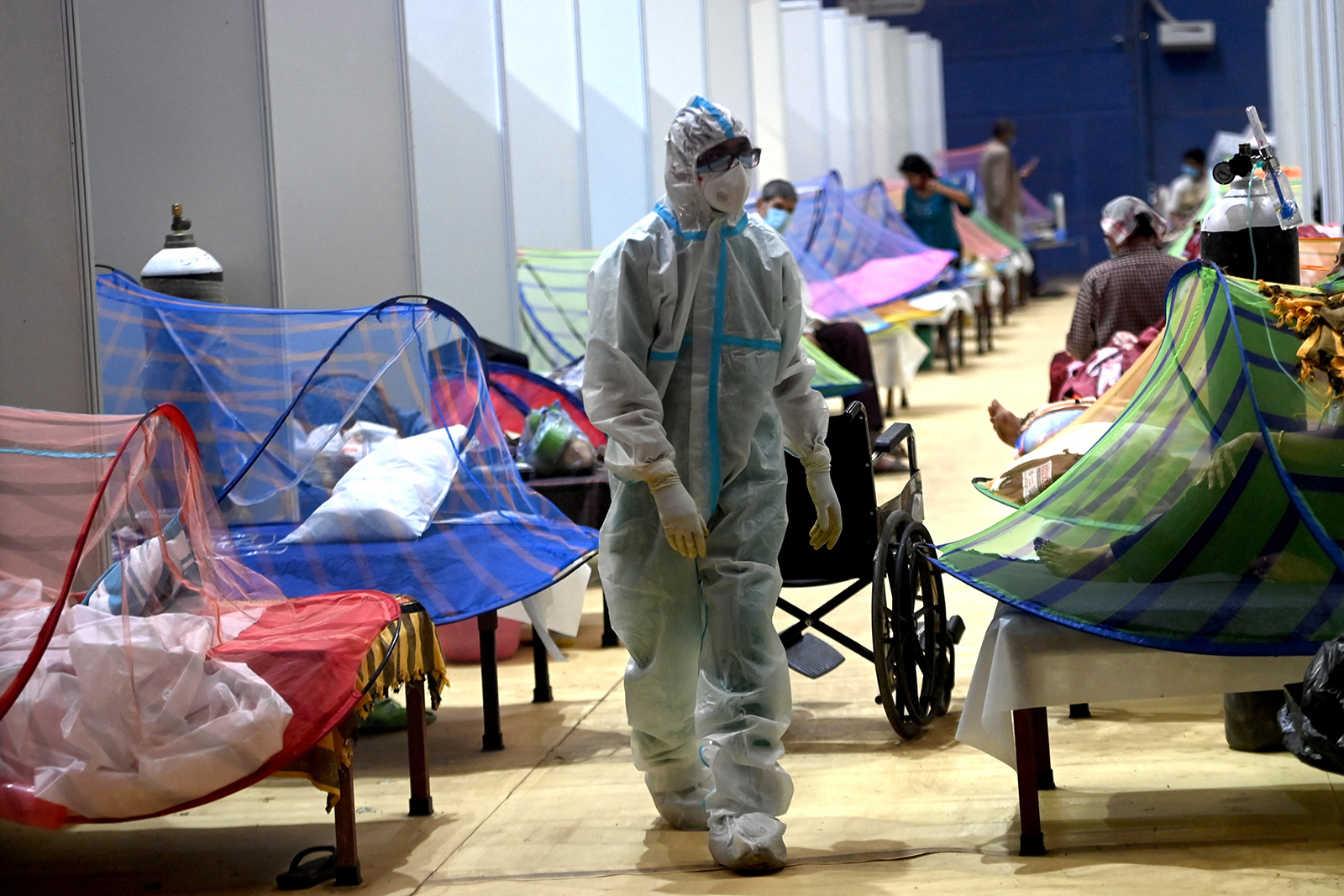
India reported a 412,262 new Covid-19 cases Thursday, a new single-day record, according to a CNN tally compiled from figures released by the Indian Health Ministry.
To date, authorities have identified 21,077,410 cases of coronavirus.
The country also reported 3,980 Covid-19 related deaths on Thursday, another new single-day record. It was the ninth consecutive day that the number of fatalities identified in a 24-hour period exceeded 3,000.
To date, 230,168 who have contracted the virus in India have died.
India is in the midst of a severe second wave of cases. In the past 30 days, the country has recorded 8.3 million cases. Since April 22, more than 300,000 cases have been added every day.
BAK
JF-Expert Member
- Feb 11, 2007
- 124,789
- 288,011
- Thread starter
- #77
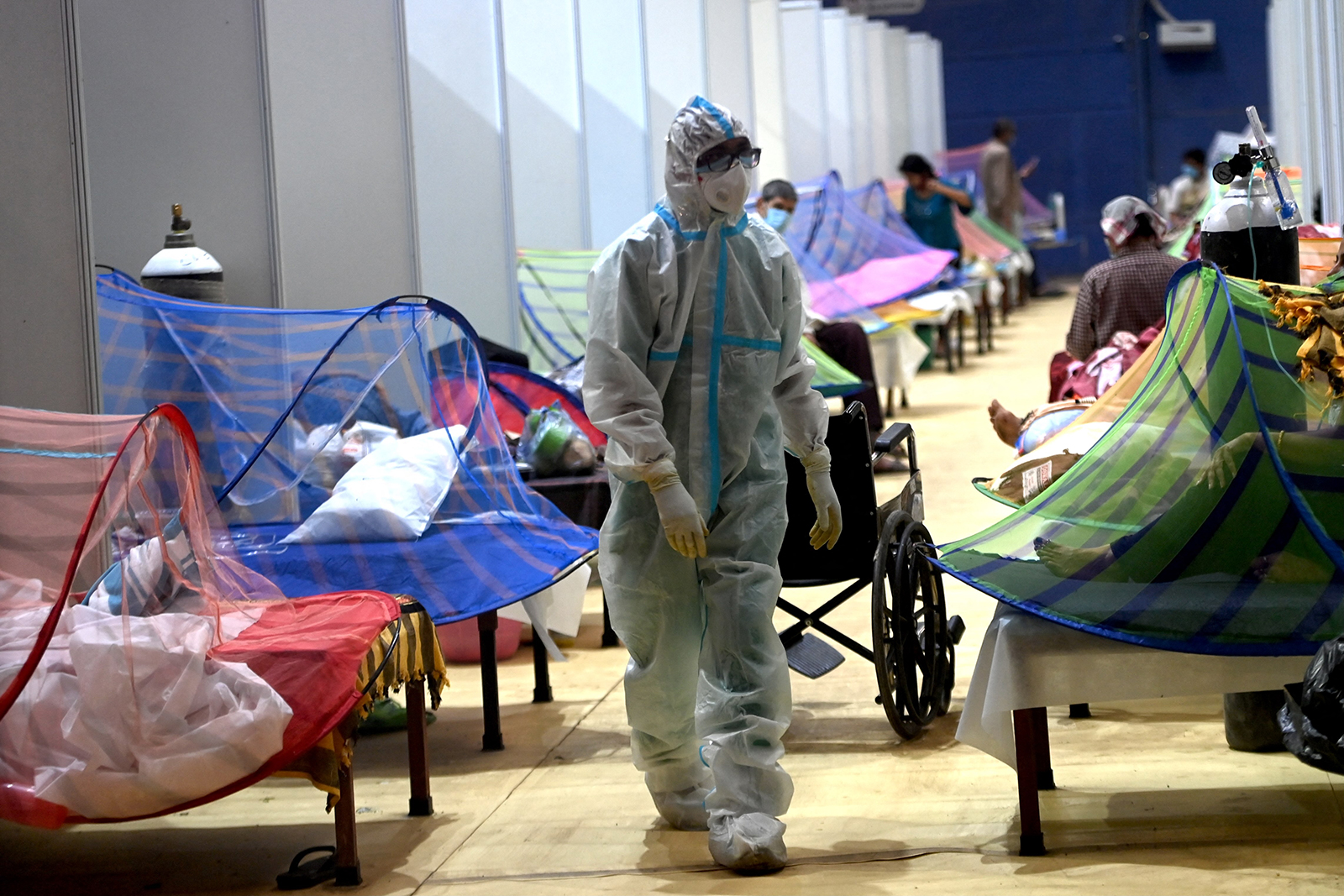
India reports highest-ever 24-hour surge in Covid-19 cases and a record-high daily death toll
The coronavirus pandemic has brought countries to a standstill. Meanwhile, vaccinations have already started in some countries as cases continue to rise. Follow here for the latest.
BAK
JF-Expert Member
- Feb 11, 2007
- 124,789
- 288,011
- Thread starter
- #78
Tanzanian experts warn of the deadly Indian Covid-19 variant
FRIDAY MAY 07 2021
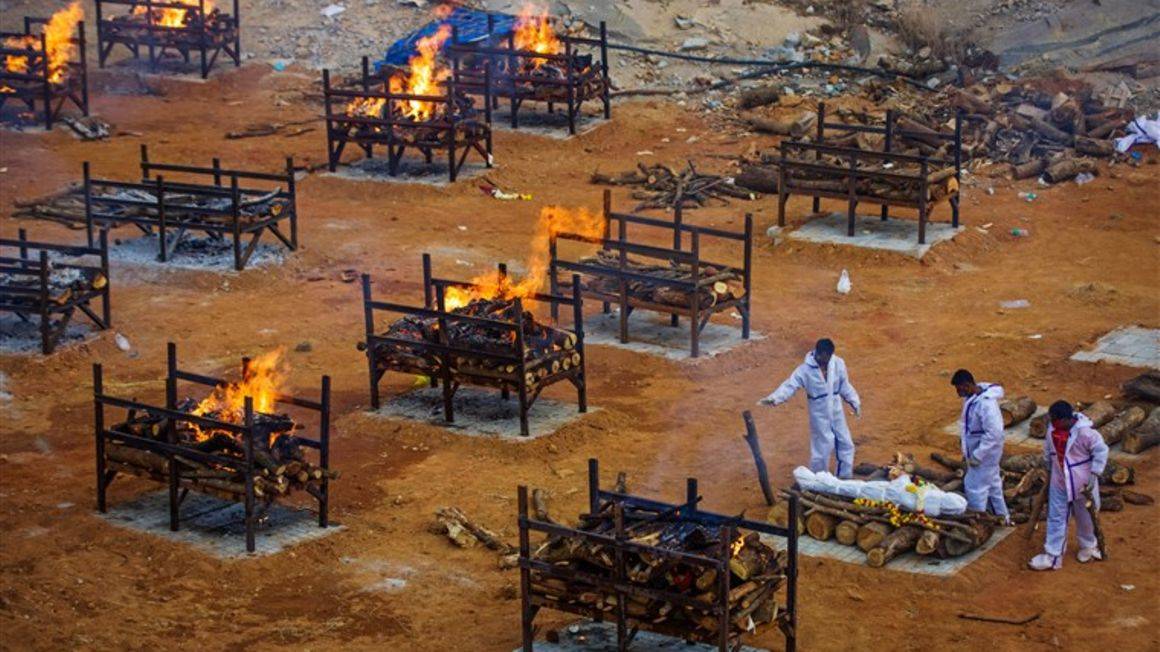
ADVERTISEMENT

By Herieth Makwetta
More by this Author
Dar es Salaam. Scientists have said a new variant of the coronavirus known as ‘double mutant’ or B.1.617 variant discovered in India is linked to two mutations that come together from the same virus.
The double mutant, which is a deadly second wave to have hit India, has caused more than 21 million cases and 230,168 deaths as of yesterday.
Speaking to The Citizen yesterday, Dr Joel Manyahi, a microbiological expert at Muhimbili University of Health and Allied Science (Muhas), said the new virus has the habit of changing its gene structure.
“The new virus changes itself and partially takes other gene cells to become a bit whitish or fade and it harbours in a human beings or animals.
“It has the habit of using proteins and partially mutates from its origin. For example, it changes from A to B and from B to C, increasing viruses that could spread more rapidly,” said Dr Manyahi.
A virologist in India, Dr Shahid Jameel, said such a situation causes two changes in meeting in one virus, adding that it could increase more infections or a human body could be affected by a vaccine.
As the scientists make studies on the new variant of the coronavirus that causes deaths in India, health experts in the country have given precautions and different techniques that would help to avoid the new deadly variant.
Doctors in the country have asked the government to push for social distancing, increase testing while capable institutions should be allowed to provide testing services and emergency hospitals with enough oxygen should be prepared.
The doctors have warned that Tanzania is supposed to be keen and learn a lesson from India that has been hit hard by a wave of the coronavirus.
However, the World Health Organisation (WHO) is yet to announce whether the new double mutant discovered in India is dangerous as it did with the variants found in the UK, Brazil and South Africa.
Similar Discussions
-
Tunayopendekeza yafanyike Tanzania hayafanyiki alafu Nchi jirani Wanafanya kweli!
- Started by Lord denning
- Replies: 18
-
-
Kati ya nchi 10 zitakazoongoza kwa kasi ya ukuaji wa uchumi duniani mwaka 2024, nchi 6 zinatoka Afrika ikiwemo Tanzania
- Started by ChoiceVariable
- Replies: 23
-
Will Tanzania's New Region Bear the Name of the Ulanga River? Splitting Morogoro Region
- Started by Tabutupu
- Replies: 68
-
Waasi wa M23/AFC walalamika Tanzania kumkamata kiongozi wao aitwae Eric Nkuba na kumkabidhi kwa Serikali ya DRC
- Started by kibarango
- Replies: 89